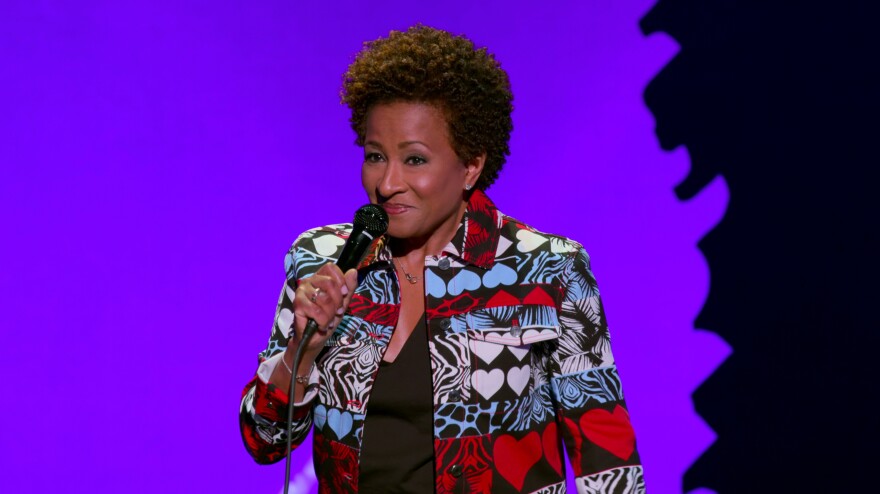Three weeks into the Hollywood writers' strike, veteran comic and WGA union member Wanda Sykes says the "survival of the craft" is at stake.
"Right now ... there's no way [a staff writer] can survive unless they have another job, something to supplement their income," Sykes says. "I'm praying and hoping [for an agreement], but ... we can't back down. This is the line in the sand."
Sykes was on the front lines of the union's last strike, in 2007. This time, her Netflix series, The Upshaws, which Sykes c0-created and co-showruns with Regina Hicks, is on hiatus because of the strike.
Sykes' previous credits include dozens of television shows and films, including Curb Your Enthusiasm, The Marvelous Mrs. Maisel, Black-ish and Mel Brooks' History of the World Part II. In her new Netflix comedy special, I'm an Entertainer, she talks about raising twins with her French wife, wonders what her life may have been like had she come out earlier in her life (she came out to her parents when she was 40) and what it's been like to live through a pandemic and an insurrection — all while continuing to go through menopause.
While some comics have complained about the difficulty of performing in a so-called "cancel culture," that's not something Sykes worries about.
"People are pissed because they can't be racist and they can't be bigots and they can't be prejudiced and they're upset about that," she says. "You can say anything you want to say. There's nothing stopping you from saying whatever the hell you want to say, but you just have to understand that there's repercussions."
Interview highlights
On the impact the comic Moms Mabley had on her (she portrayed Moms Mabley on The Marvelous Mrs. Maisel)
I was a kid. I remember sitting on the floor in front of the TV at my grandmother's house ... I think it was The Smothers Brothers. ... When Moms Mabley came out, all of us were just laughing and then I remember watching them laugh at her and going, "Oh, man, I want to do that. I want to make my grandmother laugh like that."
I was just fascinated, just fascinated by this old Black woman who kind of dressed like my big mama. I just thought she was the funniest thing. It just stayed with me. Even in college, my sorority sisters, they always laugh and stuff because they remember how after a few beverages, I would just turn into this old lady and say all kinds of crazy things. I just channel her, I love her.
On meeting her wife
We met on Fire Island, New York, on the way to Cherry Grove. I saw her on the ferry, but then we met later, like the next day on the island. ... I'm going to sound crazy here, but honestly, I heard the voice of my dead therapist. ... She had passed, like, I'm going to say at least six months [before] or something like that. And ... on the ferry and I look back, I saw this woman talking to a woman holding a baby, and she was playing with this baby, so I thought they were together. I thought it was a family, and [a voice] said. "Hey, Wanda, that's what you need." And I was like, "You dead! What the hell?"
On seeing her community become more supportive of her and less homophobic
It was a huge shift, and I think it starts with the church. The church is more tolerant. Just walking down the streets and stuff. I watched it. I felt it. I was like: Wow, this is getting better. Just the support and love from the community. I remember the first time I was in CVS and this older Black woman walks up to me, she's like "Wanda." And I was like, Oh, boy, what she gonna say? She's like, "I want to talk to you." I was like, Oh, God, she's gonna hit me with this [gay] stuff. And she's like, "How's your family doing? How's those kids?" I literally had tears in my eyes walking to my car. I remember that. And little things like that just kept happening.
On raising white kids as a Black mother
I'm raising them the way I was raised because I don't know any other way to raise them. I don't know if white people raise their kids saying, "Now, look, you know you can cut the line, right?" Is there a white handbook? It's like the talk where Black parents give their kids about when you get pulled over by the police, how to behave. It's like I'm about to give my kids that talk and I go, "Wait a minute, I don't need to do this. They're white." I'll tell [my daughter] Olivia, "If the cops pull you over, just start crying. They'll let you go. You're white. You're a beautiful, young white girl. Just cry and they'll let you go."
Heidi Saman and Seth Kelley produced and edited this interview for broadcast. Bridget Bentz, Molly Seavy-Nesper and Beth Novey adapted it for the web.
Copyright 2023 Fresh Air. To see more, visit Fresh Air.




